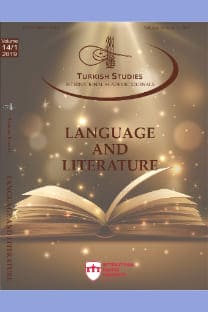Two Inspirations by Sainte-Beuve and Tolstoy: Art and Canon
Sainte-Beuve ve Tolstoy’dan İki Esin Kaynağı: Sanat ve Kanon
___
Bloom, H. (1994). The western canon. The books and school of the ages. Harcourt Brace & Company.Chaloemtiarana, T. (2009). Making new space in the Thai literary canon. Journal of Southeast Asian Studies, 40 (01), 87-110.
Compagnon, A. (1995). Sainte-Beuve and the canon. MLN, 110 (5), 1188-1199.
Delbanco, A. (1997). Required reading: Why our American classics matter now. Farrar, Straus and Giroux.
Eagleton, T. (2008). Literary theory: An introduction. Blackwell Publishing.
Eckermann, J.P. (1964). Conversations with Goethe (O’Brien G.C, Trans.). New Yorks Frederick Ungar Publishing. (Original work published 1836).
Eliot, T.S. (1944). What is a classic?. Faber & Faber.
Eliot, T. S. (2011). The waste land and other poems. Broadview Press.
Heinzkill, R. (1990). The literary canon and collection building. Collection Management, 13 (1-2). 51-64.
Hardison, Jr, O.B. (1962). Modern continental literary criticism. Meredith Publishing.
Heidegger, M. (2002). Heidegger: Off the beaten track. Cambridge University Press.
Joyce, J. A. (1987). The black canon: Reconstructing black American literary criticism. New Literary History, 18 (2), 335-344.
Juvan, M. (2004). Literary self-referentiality and the formation of the national literary canon. Neohelicon, 31 (1), 113-123.
Kaltenbrunner, W. (2010). Literary positivism? Scientific theories and methods in the work of
Sainte-Beuve (1804-1869) and Wilhelm Scherer (1841-1886). Stadium, (3), 74-88.
Kolbas, D. (2001). Critical theory and the literary canon. Westview Press.
Ning, W. (2004). Canon formation, or literary revisionism. Neohelicon, 31 (2), 159-174.
Pollock, G. (1999) Differencing the canon feminist desire and the writing of art’s histories. Routledge.
Price, K.M. (2009). Digital scholarship, economics, and the american literary canon. Literature Compass, 6 (2), 274-290.
Redfearn, D. (1992) Tolstoy principles for a new world order. Shepheard – Walwyn London.
Rusch, G. (1999). The status of authors within literary systems: challenging the canon. An explorative investigation of Alfred Döblin’s status within the German literary system in 1997. Poetics, 26 (5-6), 367-384.
Sainte-Beuve (2008). Essays by Sainte-Beuve. London: "Walter Scott, Ltd. https://archive.org/details/essaysbysaintebe00sain/page/n9/mode/2up
Simmons, E. J. (1946). Leo Tolstoy. John Lehmann.
Taine, H. (1871). History of english literature (Van Laun, H, Trans.). Holt &Williams. (Original work published 1863).
Terry, R. (2001). Poetry and the making of english literary past 1660- 1781. Oxford.
Tolstoy, L. (1995). What is art? (Pevear, R. & Volokhonsky, L, Trans.). Penguin Classics. (Original work published 1897).
Williams, R. (1977) Marxism and literature. Oxford University Press.
- ISSN: 2667-5641
- Yayın Aralığı: 4
- Başlangıç: 2006
- Yayıncı: ASOS Eğitim Bilişim Danışmanlık Otomasyon Yayıncılık Reklam Sanayi ve Ticaret LTD ŞTİ
The Turkish Take on Audiovisual Translation: A Story of Politics and Evolution
Reşat Nuri’de İdealizm ve Tiyatronun Birleştiği Nokta: Son Sığınak
Reşat Nuri Güntekin’in Dudaktan Kalbe Adlı Romanında Yabancılaşma İzleği
Salah Birsel’in Şiirlerinde Dil Sapmaları
Distopik Bir Romanın Kurgusu ve Çözülümü: Kazuo Ishiguro’nun Never Let Me Go Romanı
Dirijizmden Dramaturjiye: Reşat Nuri’nin “Bir Yağmur Gecesi” Piyesi
Fuzûlî Divanı’ndan Hareketle Klasik Türk Şiirinde Su Kültü*
Women’s Image and Patriarchal Practices in Shakespeare’s Hamlet and Köksal’s Sacide*
Reşat Nuri Güntekin'in Yeşil Gece Adlı Romanında Kavram Alanı Üzerine Bir Deneme
Türkiye’de Görsel-İşitsel Çeviriye Üstsel bir Bakış: Politika ve Evrim
